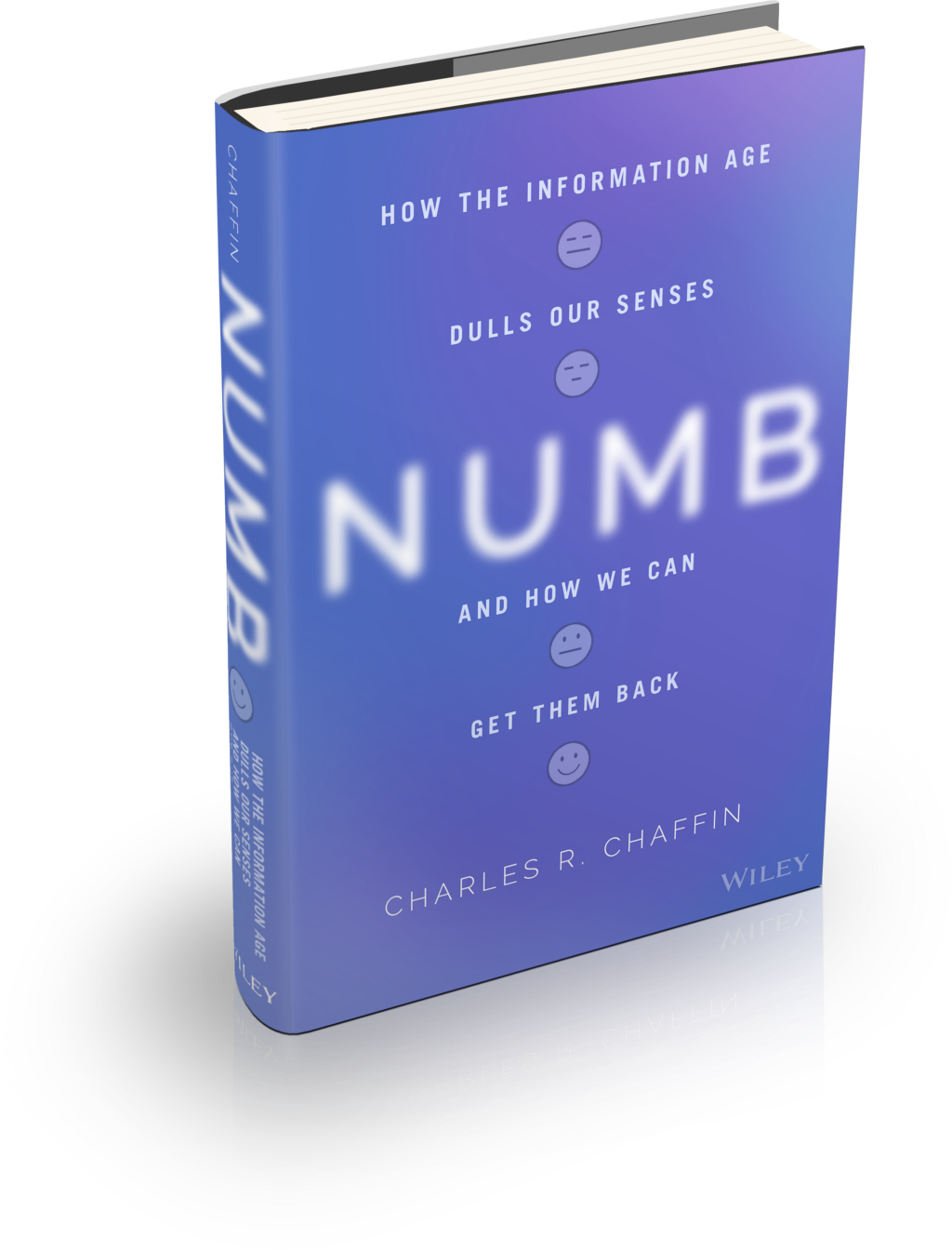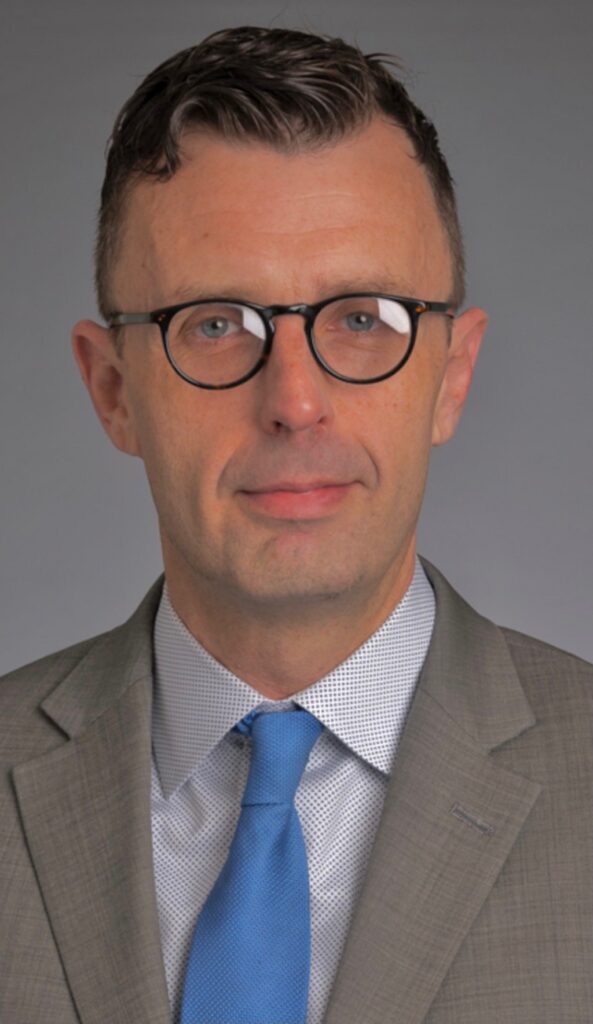An Interview With Edward Sylvan
I hope that Numb can help people manage the devices and the information that goes along with it, so that it all isn’t managing them. We are all looking for some level of productivity and authenticity in our lives and I hope that Numb helps people find it.
As part of my series about “authors who are making an important social impact”, I had the pleasure of interviewing Dr. Charles Chaffin.
Dr. Charles R. Chaffin writes and speaks on a variety of topics related to cognition, attention, and human behavior. His research focuses on multitasking and its relationship to human performance in a variety of settings. In his previous books, Dr. Chaffin takes complex topics and makes them relevant to a broader population. In Numb: How the Information Age dulls our senses and how we can get them back, he brings research, storytelling, and humor to one of the largest issues of our time: Managing our attention when so many devices and platforms are trying to steal it away.
Thank you so much for joining us in this interview series! Before we dive into the main focus of our interview, our readers would love to “get to know you” a bit better. Can you tell us a bit about your childhood backstory?
Thank you for having me. I grew up in Pittsburgh in the 90s. During that time, it was difficult for people like my parents who did not have a college education to make it all work. They worked two jobs each without a lot of money. For me, that meant using my imagination to bring excitement to life as a child. It also meant developing a curiosity about the world, which I think has helped me as a researcher in helping to answer questions that have meaning for (hopefully) a lot of people.

When you were younger, was there a book that you read that inspired you to take action or changed your life? Can you share a story about that?
As strange as it might sound, Richard Carlson’s Don’t Sweat the Small Stuff was quite impactful to me. I had teachers who read it multiple times as a source of comfort to them and I ended up doing the same. It was (and perhaps is) a book that people reference as a reminder of how to keep things in perspective. The short chapters made the book so accessible and I really tried to do the same with Numb. Change is hard when it comes to anything and if a book can be accessible in the first read, it might be accessible on the second or third…and that is what I hope for Numb.
Can you share the funniest or most interesting mistake that occurred to you in the course of your career? What lesson or take away did you learn from that?
Before heading off to get my doctorate, I spent a few years teaching in public schools. I remember taking a large group of high school students on a trip to a college somewhere. We had finished our visit and all eight buses of high schoolers were waiting to leave when a parent chaperone approached and said, “we are missing two kids. A boy and a girl.” Fear set in! Some parents went looking for the two kids, while me (and hundreds of antsy high school students) waited. I was getting more and more furious as time went on. Finally, I see the boy and girl walking towards our buses, taking their sweet time. It was as if the world could just wait for them. I walked quickly to both of them and said, “I cannot believe that you kept us waiting. We have been sitting here because you thoughtlessly ignored our instructions. Now get on the bus!” The kids tried to interject, “but sir…” I responded, “Don’t say anything, just get on the bus!” They hesitated to get on the bus, but I told them they needed to do it quickly or there would be further consequences. As they meekly got onto the bus, a parent chaperone came running over to me, “Sir. Those aren’t our kids!” I responded to the kids, “You guys have no business on this bus. Now get moving.” One of my last episodes teaching in the public schools! Me and some of the parent chaperones who keep in touch laugh about that story…I am not sure that the two kids look back at it so fondly!
Can you describe how you aim to make a significant social impact with your book?
Our attention is the gateway to our consciousness. Everything that we feel, learn, do, and experience is impacted by our attention. In this information age, this precious commodity, for which we have so little, is being hijacked by devices, platforms, and information. In many cases, these sources are designed to steal our attention. That comes at a great cost to our productivity and our relationships. Some people are spending 2–6 hours per day on social media, cable news, YouTube, and other platforms, looking for deeper relationships or just in a dopamine loop. I hope that Numb can help people manage the devices and the information that goes along with it, so that it all isn’t managing them. We are all looking for some level of productivity and authenticity in our lives and I hope that Numb helps people find it.
What was the “aha moment” or series of events that made you decide to bring your message to the greater world? Can you share a story about that?
Beyond my research on attention, I began to wonder about how the constant exposure to the suffering of others would impact our ability to be compassionate. How each story of human suffering received its 15 minutes of fame, impacting the way we look at the suffering of those closest to us. As Numb was developed, I began to think about all of the other ways that this information age impacted our ability to be authentic, productive, and loving. However, this work all started with my thinking about compassion.
Without sharing specific names, can you tell us a story about a particular individual who was impacted or helped by your cause?
I am fortunate to have a lot of people who are immensely supportive of my ideas (and me, hopefully of them). There is something special about being around people who discuss all the reasons why something WILL work before talking about what it won’t. It is a nurturing of our dreams and wonderments that is so valuable to me. I do wonder how many more great inventions and ideas would come into being if everyone had that level of support in their lives.
Are there three things the community/society/politicians can do to help you address the root of the problem you are trying to solve?
Section 230 of the Communications Act needs a major overhaul. How do we address misinformation while still allowing free speech? Platforms have a responsibility on some level for addressing false narratives while still supporting people’s ability to express themselves. Related, our attention is being stolen by technology, platforms, and devices of all forms. It comes at an incredible cost, most notably our productivity, authenticity, and ability to have meaningful engagement with others. We as a society need to recognize that, at the end of the day, the 2, 3, 4, 5 hours a day we are spending on apps, social media, and cable news is not worth it. It’s an ROI. The investment of our most valuable resource- our attention- is not giving us the authentic experiences and meaningful relationships that we are hoping for. I hope that Numb helps people reflect and consider this return on their investment.
How do you define “Leadership”? Can you explain what you mean or give an example?
I define leadership through the lens of education. As an educator, if I can give someone the tools to help them be their best selves, in their career or as human beings, I am leading them to a path of happiness and productivity. Education then comes through example in being a model for others to want to emulate or information that is used as a tool for the individual to achieve their goals and dreams.
What are your “5 things I wish someone told me when I first started” and why. Please share a story or example for each.
- Listen more
We all need to listen more. We would be so much smarter and hear the other perspective. I often think that, as counterintuitive as it sounds, if we listened more we would be heard more.
2. Take time to be with yourself, reflect, and recharge
Work-life balance. Being a full person in feeding all sides of our being benefits everyone around us. Having a depth of understanding is a good thing, but in order to bring your full self to solve whatever problem, you have to be happy, centered, and rested.
3. Always have something that excites you
We can find ourselves mired in the day-to-day. We have to be working towards something that excites us. It could be the next great project, supporting our families, or a happy and productive retirement. We must be purposeful in creating projects, experiences, and ideas that excite us to want and do more.
4. It doesn’t cost much to have a little class
Tipping your hotel housekeeper appropriately or finding excuses to show appreciation for a job well done is a wonderful gift we can give to others as well as fuel future good work! Showing a genuine appreciation for the work of others is an important skill, and we might be providing a piece of positive feedback to someone who, rarely if ever, receives any. What a great gift to give someone!
5. Giving is receiving
We get so much more when we work to help others. Cliché but so true!
Can you please give us your favorite “Life Lesson Quote”? Can you share how that was relevant to you in your life?
“If you aren’t where you are, you are nowhere.” We need to be present with our work or when in the presence of others. I believe that the greatest gift we can give another person is to devote our full attention to them. When they know that there is no one else in the world that we want to be, but with them in that moment.
Is there a person in the world, or in the US with whom you would like to have a private breakfast or lunch with, and why? He or she might just see this, especially if we tag them. :-).
Jose Andres. How could someone impact the world more than him? His big heart, business sense, and culinary gifts have affected so many people. I would love to take him to lunch (and let him order for the both of us!).
How can our readers further follow your work online?
- The Numb Podcast- available on iTunes, Spotify, Audible, and most places where you get podcasts
- CharlesChaffin.com
- Pick-up Numb: How the information age dulls our senses and how we can get them back
- Twitter: @charchaf
This was very meaningful, thank you so much. We wish you only continued success on your great work!
Social Impact Authors: How & Why Charles Chaffin of ‘Numb’ Is Helping To Change Our World was originally published in Authority Magazine on Medium, where people are continuing the conversation by highlighting and responding to this story.
